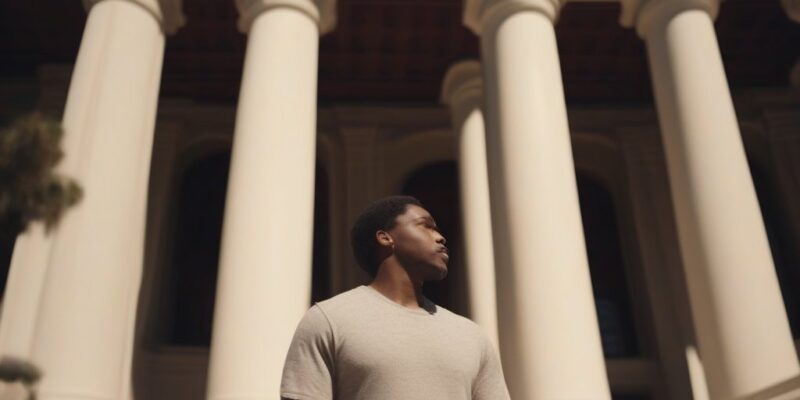As an expert blogger with years of experience, I can confidently say that the recent c.w. park USC lawsuit has captured the attention of many. In this article, I’ll delve into the details of this high-profile case, providing you with a comprehensive understanding of its background, implications, and potential outcomes.
The c.w. park USC lawsuit revolves around allegations of discrimination and retaliation against a former professor at the University of Southern California. This case has sparked a heated debate about academic freedom, diversity, and the responsibilities of educational institutions. In the following paragraphs, I’ll explore the key players involved, the legal arguments presented, and the potential impact this lawsuit may have on the future of higher education. So, let’s dive in and unravel the complexities of the c.w. park USC lawsuit together.
Background of the c.w. park USC lawsuit
As an expert blogger exploring the c.w. park USC lawsuit, let me provide you with some insights into the background of the case. It’s crucial to understand the context before delving into the key players and legal arguments.
The c.w. park USC lawsuit centers around allegations of discrimination and retaliation filed by a former professor against the University of Southern California. The professor, c.w. park, claims that he faced adverse employment actions due to his race and his outspoken views on diversity and inclusion within the institution.
Park, a renowned scholar in the field of communication, had been a faculty member at USC for several years. He argues that his comments on controversial topics, such as affirmative action and minority representation, led to a hostile work environment and ultimately, his termination.
The lawsuit has ignited a broader discussion about academic freedom, diversity, and the responsibilities of educational institutions. Many are watching this case closely as it could have significant implications for higher education and the ability of faculty members to express their opinions without fear of retaliation.
While the specific details of the case will be examined in more depth later, it’s important to note that the allegations made by park are serious and raise important questions about the treatment of faculty and the commitment to diversity within USC.
Stay with me as we delve into the key players involved, the legal arguments presented, and the potential impact of this lawsuit on higher education.
Allegations of discrimination and retaliation
In the c.w. park USC lawsuit, serious allegations of discrimination and retaliation have been made. These allegations are at the heart of the legal battle between c.w. park, a former professor at the University of Southern California, and the institution itself.
c.w. park claims that he faced adverse employment actions due to his race and his outspoken views on diversity and inclusion within the university. According to his lawsuit, park, who is Asian-American, was subjected to a hostile work environment and faced discrimination based on his race. Additionally, park asserts that he was retaliated against for advocating for diverse perspectives and challenging the status quo within the institution.
The allegations of discrimination and retaliation raise important questions about the responsibilities of educational institutions to promote diversity and ensure a fair and inclusive work environment. It also highlights the challenges that minority voices can face when speaking up on issues of social importance.
The lawsuit has garnered attention, not only within the academic community but also in the broader social and legal spheres. It has sparked a necessary discussion about academic freedom, diversity, and the treatment of faculty members who dissent from institutional norms.
While the outcome of the c.w. park USC lawsuit is still uncertain, it serves as a reminder of the importance of addressing issues of discrimination and retaliation within higher education. It also underscores the need for universities to foster an environment that encourages diverse perspectives and values the contributions of all faculty members, regardless of their race or background.
The allegations raised in this lawsuit have far-reaching implications for both c.w. park and the institution involved. As the case moves forward, it will be closely watched by those advocating for equality and social justice within academia.
Academic freedom and diversity in focus
When examining the c.w. park USC lawsuit, it is essential to consider the broader implications it has on academic freedom and diversity. This case has sparked a significant discussion around these crucial issues within educational institutions.
Academic Freedom
Academic freedom is the cornerstone of higher education, as it allows scholars to pursue and share knowledge without fear of repercussions. It ensures that educators have the freedom to explore controversial topics, challenge prevailing ideas, and engage in critical discourse. Academic freedom is vital for the advancement of knowledge and the pursuit of truth.
In the c.w. park USC lawsuit, the allegations of adverse employment actions against Professor c.w. park raise concerns about whether academic freedom was upheld within the institution. If the claims of discrimination and retaliation prove to be true, it could have a chilling effect on the willingness of faculty members to express their opinions on sensitive issues.
Promoting Diversity and Inclusion
Diversity and inclusion are fundamental values in educational institutions. They promote a welcoming and equitable environment that embraces individuals from all backgrounds and perspectives. When diverse voices are heard, it fosters creativity, innovation, and a richer educational experience for everyone involved.
The c.w. park USC lawsuit highlights the challenges that can arise when individuals express their views on diversity and inclusion. Professor c.w. park has claimed that his outspokenness on these topics played a role in the alleged adverse employment actions he faced. This raises important questions about the responsibilities of educational institutions to actively promote diversity and ensure a fair and inclusive work environment.
The Impact on Equality and Social Justice
The outcome of the c.w. park USC lawsuit will have significant implications for those advocating for equality and social justice in academia. If the allegations of discrimination and retaliation are proven to be true, it would underscore the need for institutions to address these issues and ensure that minority voices are protected.
By closely watching the developments of this case, those committed to promoting diversity and social justice can gain insights into potential strategies for effecting change within educational institutions. It serves as a reminder of the ongoing work required to create an inclusive and equitable environment for all faculty members, regardless of their race or the opinions they express.
Key players in the lawsuit
In this section, I’ll introduce you to the key players involved in the c.w. park USC lawsuit. These individuals and organizations play a significant role in shaping the outcome of the case and have a direct impact on academic freedom and diversity in higher education.
- c.w. park: As the plaintiff in the lawsuit, c.w. park is an esteemed professor in the Department of Cinema and Media Studies at the University of Southern California (USC). He alleges that his academic freedom and free speech rights were violated when he was terminated from his position after expressing controversial views on diversity and inclusion.
- University of Southern California (USC): As one of the most prestigious academic institutions in the United States, USC is at the center of this lawsuit. The university is accused of violating c.w. park’s rights and has the responsibility to defend its actions and uphold the principles of academic freedom.
- Faculty Advocacy Organizations: Several faculty advocacy organizations have shown support for c.w. park during this legal battle. These organizations aim to protect the rights of professors and advocate for academic freedom in higher education. They play a crucial role in raising awareness about the importance of free expression and the potential consequences of suppressing dissenting viewpoints.
- The Legal Team: Both c.w. park and USC have assembled their legal teams to represent them in court. These teams of experienced lawyers and legal experts will argue their respective cases and present evidence to support their claims. The legal strategies employed by each side will heavily influence the outcome of the lawsuit.
It’s important to understand the roles and perspectives of these key players to fully grasp the complexity and significance of the c.w. park USC lawsuit. Their actions and decisions will shape the future of academic freedom and diversity in higher education, making this case a pivotal moment for the entire academic community.
Remember, it’s crucial to approach this topic with sensitivity and respect for different perspectives.
Legal arguments presented
In the c.w. park USC lawsuit, both sides have presented compelling legal arguments to support their positions. As the case unfolds, it becomes increasingly clear that the outcome will have far-reaching implications for academic freedom and diversity in higher education.
One of the central arguments put forth by c.w. park’s legal team is that his termination from USC violated his First Amendment rights. They argue that by disciplining park for expressing his views on diversity and inclusion, the university infringed upon his right to free speech. In their view, academic freedom should extend to all faculty members, regardless of the controversial nature of their opinions.
On the other hand, the University of Southern California’s legal team argues that park’s termination was justified based on his inappropriate and harmful remarks. They contend that while academic freedom is essential, it does not grant individuals the right to engage in discriminatory practices or make derogatory statements. In their view, park’s comments were not protected under the First Amendment and warranted disciplinary action.
Faculty advocacy organizations have also weighed in on the lawsuit, supporting the importance of academic freedom while recognizing the need for accountability. They argue that individuals should be able to express their opinions freely, but that it is also crucial to maintain a safe and inclusive environment for all students and faculty members.
Navigating the complexities of this case is not easy, as it revolves around balancing competing rights and values. The legal arguments presented highlight the ongoing debates surrounding the boundaries of free speech and the responsibility of educational institutions to promote diversity and inclusion.
The outcome of the c.w. park USC lawsuit will undoubtedly shape the future of academic freedom and diversity in higher education. It is essential to closely follow the proceedings and understand the perspectives of the key players involved. By doing so, we can gain a deeper understanding of the complexities of this case and its potential impact on the academic community.
Potential impact on higher education
The c.w. park USC lawsuit has the potential to significantly impact higher education, particularly in regards to academic freedom and diversity. This case has raised important questions about the boundaries of free speech and expression within educational institutions.
Academic freedom is a fundamental principle in higher education that ensures scholars have the autonomy to pursue research, teach, and engage in public discourse without fear of reprisal. It allows for a vibrant exchange of ideas and fosters intellectual growth. The outcome of this lawsuit could set a precedent for how academic freedom is protected and upheld in the future.
Furthermore, the case brings attention to the importance of diversity and inclusion on college campuses. It raises questions about the responsibilities of educational institutions in promoting these values and fostering an inclusive environment for all students and faculty. The lawsuit has sparked conversations about the challenges involved in addressing sensitive topics related to diversity and inclusivity, and how to navigate those conversations while upholding academic freedom.
If c.w. park’s termination is found to be unjustified and a violation of his First Amendment rights, it could have a chilling effect on faculty members who may be hesitant to express their views on controversial subjects for fear of facing similar consequences. This could limit the diversity of perspectives within higher education institutions and hinder the open exchange of ideas.
On the other hand, if the court upholds c.w. park’s termination as justified, it may send a message that educational institutions have the authority to discipline faculty for speech they deem inappropriate or offensive. While this would demonstrate accountability, it may also raise concerns about potential censorship and infringement on academic freedom.
It is important for the academic community and the public to closely follow the proceedings and understand the perspectives of all key players involved. By doing so, we can gain a deeper understanding of the complexities of the case and the potential implications for academic freedom, diversity, and the future of higher education.
Conclusion
In exploring the c.w. park USC lawsuit, we have delved into the crucial issues of academic freedom and diversity within higher education. It is evident that this case has far-reaching implications for the protection and upholding of academic freedom in the future. Additionally, it has shed light on the significance of diversity and inclusion on college campuses and the responsibilities of educational institutions in promoting these values.
As we await the outcome of the lawsuit, it is crucial for us to closely follow the proceedings and understand the perspectives of the key players involved. By doing so, we can gain a deeper understanding of the complexities of the case and its potential impact on the academic community. This case serves as a reminder of the ongoing challenges faced when expressing views on diversity and inclusion, and prompts us to critically examine the role of educational institutions in fostering an environment that embraces these values.
The c.w. park USC lawsuit serves as a pivotal moment for the academic community. It calls for a reevaluation of the principles of academic freedom and diversity within higher education, and challenges us to actively engage in discussions surrounding these issues. By staying informed and advocating for these fundamental values, we can contribute to a more inclusive and intellectually vibrant educational landscape.


